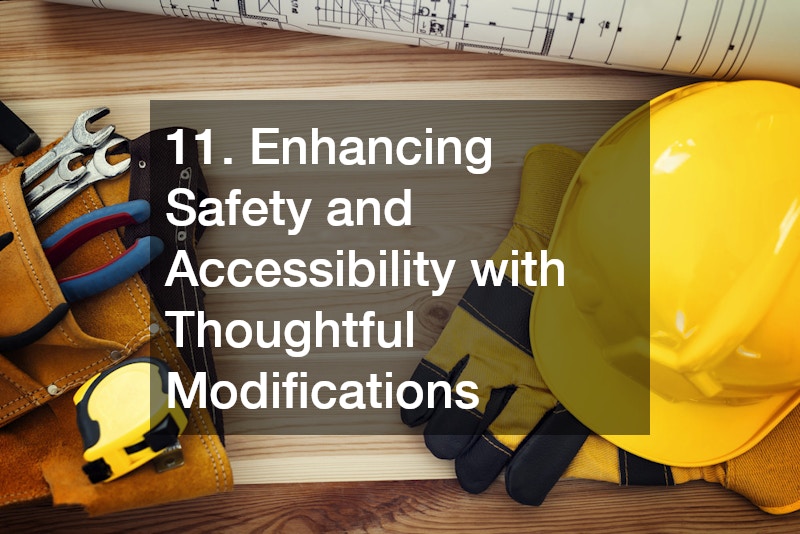Creating a safe, comfortable, and supportive environment for families with young children and seniors is of utmost importance. Homes should serve as sanctuaries where everyone, regardless of age, can thrive in a secure and nurturing setting. In today’s world, where essential healthcare services and innovative products are more accessible than ever, it’s crucial to recognize how specialized products and services can cater to the unique needs of these age groups. Young children require spaces that encourage growth and development while keeping them safe, while seniors benefit from adaptations that ensure mobility, independence, and dignity.
The key to achieving this balance lies in understanding the specific challenges faced by these age groups and addressing them proactively. From healthcare to home modifications, every detail matters in creating an environment that promotes well-being. For instance, installing energy-efficient systems, maintaining access to quality healthcare, and making thoughtful design choices can dramatically enhance the quality of life for both children and seniors.
This article provides actionable advice on how to optimize living conditions for these age groups, focusing on practical steps to create a harmonious home. By prioritizing their health, comfort, and safety, families can foster a lifestyle that supports growth, happiness, and resilience for all members.
1. Ensuring Year-Round Comfort at Home
Efficient heating, ventilation, and air conditioning systems, or HVAC services, play an essential role in maintaining a comfortable indoor environment. Consistent temperature control is vital for families with young children and seniors, as both age groups are more vulnerable to extreme weather conditions. Selecting energy-efficient HVAC services not only minimizes costs but also contributes to a sustainable living environment.
Regular maintenance of these systems is an integral part of ensuring year-round comfort. Clean air is crucial, especially for seniors with respiratory issues or young children prone to allergies. Scheduling annual check-ups and filter replacements can prevent breakdowns and promote a healthy indoor climate.
By investing in proper HVAC services, families can create a home that is both comfortable and welcoming. Energy-efficient systems reduce overall costs while maintaining optimal temperatures, providing essential healthcare services. Regular maintenance ensures reliability and longevity, offering peace of mind throughout the year.
2. Restoring Mobility and Independence

Rehabilitation therapy is a key component of restoring mobility and independence for seniors after surgeries or injuries. It also supports children with developmental delays, ensuring that they reach their full potential. By working with licensed therapists, families can receive tailored plans that address individual needs, promoting recovery and progress.
Finding reputable local rehabilitation centers or at-home therapy services can significantly impact a senior’s or child’s quality of life. Trustworthy rehabilitation therapy providers are vital in delivering essential healthcare services that facilitate regain of mobility and independence. These centers provide expertise that supports physical recovery and emotional well-being.
Engaging with skilled therapists who understand the unique challenges faced by both age groups ensures effective outcomes. Rehabilitation therapy isn’t just about physical progress; it’s about enhancing the overall quality of life and fostering independence for seniors and children alike. Choosing the right provider is crucial for maximizing benefits and achieving the best possible results.
3. Access to Critical Supplies for Everyday Needs
Access to quality medical supplies is essential for families managing the everyday needs of young children and seniors. From mobility aids like walkers and wheelchairs for seniors to pediatric essentials like nebulizers for children, having the right tools on hand can make a significant difference in maintaining health and independence. Selecting reliable suppliers ensures that these critical needs are consistently met.
Understanding insurance coverage is an important aspect of obtaining medical supplies. Families should explore their policies to ensure necessary items are covered, reducing out-of-pocket expenses. Having a clear understanding of what is covered empowers families to make informed decisions when acquiring essential healthcare services.
Stocking first aid kits and emergency supplies tailored to both seniors and children is also vital. Being prepared for unforeseen situations can save crucial time and stress in emergencies. Having a well-stocked kit accessible at home ensures that families can address minor injuries or emergencies with confidence.
4. Creating Shady and Comfortable Outdoor Spaces

Installing awnings for windows is a smart way to enhance energy efficiency and create comfortable outdoor spaces for families. Awnings provide valuable shade that can reduce indoor temperatures, leading to lower energy costs by reducing the need for air conditioning. For seniors and young children, shaded areas are essential for enjoying outdoor activities safely and minimizing exposure to harsh sunlight.
Beyond energy savings, awnings offer protection against harmful UV rays. Such protection is crucial for both age groups, who are more susceptible to sun damage and related health risks. Awnings for windows can significantly enhance outdoor comfort while ensuring safety from harmful exposure.
Choosing durable and easy-to-maintain awning materials is important for longevity and practicality. Materials that withstand various weather conditions and require minimal upkeep are ideal choices for families looking to invest in long-term outdoor solutions. Durable awnings complement essential healthcare services by enhancing both indoor efficiency and outdoor enjoyment.
5. Preparing for Unplanned Health Needs
Having access to nearby urgent care facilities is crucial for efficiently addressing unplanned health needs. Urgent care centers provide timely medical attention for non-emergency situations, bridging the gap between routine care and emergency room visits. This accessibility is vital for families with young children and seniors, who may require immediate care at unexpected times.
When comparing urgent care services to emergency rooms, considerations such as cost and convenience come into play. Urgent care facilities offer a more affordable and quicker option for non-life-threatening issues, making them a preferred choice for many families. These attributes make urgent care services a practical part of essential healthcare services in community settings.
Researching and selecting the best urgent care providers in your area involves assessing factors like location, services offered, and patient reviews. Establishing a relationship with a nearby facility ensures that reliable care is just a visit away when unexpected health needs arise. Being prepared with urgent care options enhances peace of mind for parents and caregivers alike.
6. Building a Trustworthy Medical Network

Connecting with skilled and compassionate medical professionals is a cornerstone of quality healthcare for families. Building a reliable medical network that includes family physicians and specialists ensures comprehensive care tailored to the unique needs of both seniors and children. These connections form the backbone of essential healthcare services, providing support and expertise through every stage of life.
Fostering relationships with family physicians and other medical professionals is vital for proactive health management. These relationships facilitate open communication, timely interventions, and personalized care plans. Regular check-ups are an important aspect of preventive care that keeps families informed and ahead of potential health challenges.
Engaging medical professionals who are attuned to the needs of these specific populations creates an environment of trust and confidence. A cohesive medical network encourages families to seek guidance and treatment freely, ensuring that no health concerns are left unaddressed. Establishing strong connections with healthcare providers fosters lifelong well-being for loved ones.
7. Providing Comfort During Critical Times
Home hospice care services play a critical role in supporting seniors with serious illnesses and their families during emotionally challenging times. Choosing the right hospice care provider involves evaluating their ability to offer personalized care plans that cater to both medical and emotional needs. These services are integral to providing essential healthcare services that emphasize dignity and comfort at the end of life.
The evaluation of hospice care providers should focus on their ability to deliver compassionate care and emotional support. Families should seek providers adept at creating a peaceful, respectful environment that honors the wishes of the individual receiving care. This consideration ensures that home hospice care services meet both the physical and emotional needs of patients and their families.
Ensuring a dignified and peaceful environment during end-of-life care is paramount. Home hospice care services not only address physical discomforts but also provide solace and support for families navigating these difficult times. With the right provider, families can create comforting spaces that honor treasured moments with loved ones.
8. Maintaining Oral Health for Every Stage of Life

Regular general dentistry check-ups are essential for maintaining strong oral health in children and seniors. Dental care is a vital component of essential healthcare services, as oral health significantly impacts overall well-being. By scheduling consistent visits to a dentist skilled in both pediatric and geriatric care, families can ensure that dental needs are met thoroughly and compassionately.
Choosing a family dentist means seeking professionals who are prepared to address common dental issues specific to each age group. For seniors, managing conditions like gum disease and tooth decay is crucial, while for children, preventing cavities and promoting healthy habits form the foundation of lifelong oral health. Tailored dental care can prevent complications and maintain optimal health from an early age.
Understanding age-specific dental health concerns allows families to anticipate and address potential issues proactively. Professional guidance on hygiene practices, regular cleanings, and routine checks form a comprehensive approach to maintaining oral health across generations. Families benefit from well-rounded dental care, supporting both prevention and intervention as needed.
9. Nurturing Young Minds Through Education
Enrolling children in high-quality schools is fundamental for nurturing informed and emotionally balanced individuals. Education should encompass both academics and personal development, ensuring Children receive a comprehensive learning experience. Evaluating schools with criteria such as teacher qualifications, extracurricular programs, and proximity to home aids families in making informed decisions that support a child’s educational journey.
Supporting learning with a conducive home environment further enriches a child’s development. Families can create nurturing spaces that foster curiosity, calling upon educational resources that enhance the school curriculum. This holistic approach positions families to play proactive roles in their child’s learning and growth.
Essential healthcare services include attention to emotional growth and intellectual development, emphasizing the importance of education within these services. Schools that acknowledge and foster balanced growth inspire children to thrive academically and beyond. A strong educational foundation builds lifelong learners who are both knowledgeable and empathetic.
10. Managing Chronic Discomfort with Expertise
Pain management services are crucial for seniors with arthritis or chronic conditions and children recovering from injuries. Managing chronic discomfort is integral to enhancing quality of life and maintaining functionality at every age. By consulting with pain management specialists, families can access tailored treatment plans that effectively address specific needs.
Non-invasive techniques and medication play significant roles in managing pain, offering relief without extensive interventions. Essential healthcare services encompass these approaches, providing options that reduce discomfort while supporting health and independence. Specialists guide families through available methods, ensuring individualized care that recognizes unique pain challenges.
Expert guidance from pain management professionals helps to improve the well-being of individuals faced with chronic discomfort. Treatment plans should emphasize a combination of therapeutic options that address both immediate pain and its root causes. Open communication with specialists ensures that care approaches remain updated and effective, fostering comfort and progress.
11. Enhancing Safety and Accessibility with Thoughtful Modifications

Adapting homes to prioritize safety and accessibility is vital for families with young children and seniors. Thoughtful modifications can prevent accidents, reduce stress, and ensure everyone in the household feels secure. Adding simple but effective features, such as grab bars in bathrooms, non-slip flooring, and childproof locks on cabinets, can significantly enhance safety.
For seniors, installing ramps and widening doorways ensures mobility aids like walkers or wheelchairs are accommodated. Young children benefit from safeguards like safety gates and covered electrical outlets, protecting them from common hazards.
Incorporating smart home technology can further enhance accessibility. Devices like voice-activated lighting and temperature controls empower seniors to manage their environment easily. These adjustments not only meet a family’s immediate safety needs but also add long-term value to the home.
Consulting with professionals, such as local architects or home renovation experts, ensures modifications are tailored to specific needs. By taking a proactive approach to accessibility, families can create an environment where everyone thrives.
Conclusion
Embracing these essential healthcare services can significantly enhance the quality of life for families with young children and seniors. Families create safe, comfortable, and supportive environments by proactively assessing current needs and implementing the solutions discussed. It is crucial to start taking small steps toward improvement, reinforcing the commitment to sustaining the well-being of loved ones through every age and stage of life.
Safe, healthy, and nurturing home environments rely on integrating practical and thoughtful solutions. From necessary home adjustments to building strong medical networks, these initiatives outline the road to ongoing support and quality care. Begin the journey by exploring and acting upon these recommendations, fostering environments where both the young and the elderly can thrive.
Proactive engagement with the ideas and tactics proposed in this article elevates familial care to higher standards. Families can positively shape their living conditions by addressing key areas that affect comfort and health. Commit to enriching the home with essential healthcare services, bolstering satisfaction and security for all family members.

